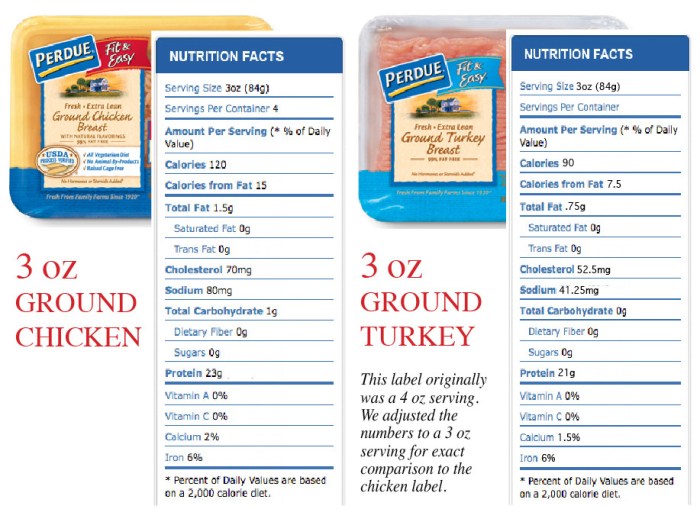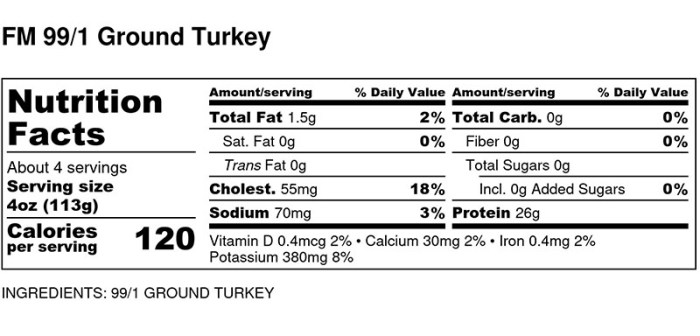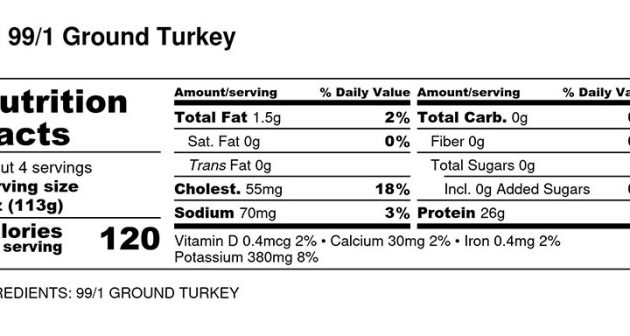Nutritional Composition of Ground Turkey

Nutrition facts ground turkey – Ground turkey, a popular lean protein source, offers a delicious and healthy alternative to other ground meats. Its nutritional profile varies depending on the leanness percentage, impacting the balance of protein, fat, and calories. Understanding this composition is key to making informed dietary choices.
Macronutrient Breakdown of Ground Turkey
The macronutrient content of ground turkey significantly changes based on its leanness. 93% lean ground turkey boasts a higher protein-to-fat ratio compared to 85% lean. For example, a 100g serving of 93% lean ground turkey typically contains around 25-28 grams of protein and 3-5 grams of fat, while 85% lean might contain around 22-25 grams of protein and 7-9 grams of fat.
Understanding nutrition facts is crucial for healthy eating, whether you’re examining the lean protein in ground turkey or considering sugary drinks. For example, comparing the nutritional profile of ground turkey to something like a dr pepper nutrition facts highlights the stark differences in caloric density and nutrient content. This comparison underscores the importance of making informed choices to support your overall health goals and maintain a balanced diet, especially when considering ground turkey as a protein source.
Carbohydrates are negligible in both. The calorie count naturally reflects this difference, with leaner varieties having fewer calories. Remember, these are approximate values and can vary based on the brand and preparation method.
Comparison of Ground Turkey with Other Ground Meats, Nutrition facts ground turkey
Choosing the right ground meat depends on your dietary needs and preferences. Here’s a comparison to help you decide:
| Meat Type | Protein (grams/100g) | Fat (grams/100g) | Calories (per 100g) |
|---|---|---|---|
| 93% Lean Ground Turkey | 26 | 4 | 150 |
| 85% Lean Ground Turkey | 23 | 8 | 180 |
| 80% Lean Ground Beef | 20 | 15 | 230 |
| Ground Chicken (Breast) | 26 | 4 | 150 |
Note: Values are approximate averages and may vary slightly depending on the brand and specific product.
Micronutrient Content of Ground Turkey
Ground turkey isn’t just about protein and fat; it’s also a good source of various essential micronutrients that contribute to overall health and well-being. These nutrients play vital roles in numerous bodily functions.Ground turkey provides several important vitamins and minerals:
- B Vitamins (Niacin, B6, B12): Crucial for energy production, nerve function, and red blood cell formation. A deficiency can lead to fatigue and neurological problems.
- Iron: Essential for oxygen transport in the blood, preventing anemia and supporting energy levels. Iron deficiency can cause fatigue and weakness.
- Zinc: Plays a vital role in immune function, wound healing, and cell growth. Zinc deficiency can weaken the immune system.
- Selenium: An antioxidant that protects cells from damage and supports thyroid function. Selenium deficiency can lead to various health issues.
Ground Turkey and Food Safety

Handling ground turkey safely is totally crucial, especially in Bali’s warm climate. Think of it like this: we’re all about enjoying delicious, healthy meals, but food poisoning is a major buzzkill. Proper handling and cooking ensures a truly awesome culinary experience without any unwanted surprises.Safe handling and storage of raw ground turkey are paramount to preventing foodborne illnesses.
Contamination can happen easily, so let’s get this right!
Safe Handling and Storage Practices
Preventing cross-contamination is key. Imagine your beautiful kitchen counter: it’s the heart of your culinary creations. Keep raw ground turkey separate from other foods, especially ready-to-eat items. Use separate cutting boards, utensils, and plates for raw turkey. After handling raw turkey, wash your hands thoroughly with soap and water for at least 20 seconds.
It’s a small effort with big rewards! Store raw ground turkey in the refrigerator at 40°F (4°C) or below, and use it within 1-2 days. Freezing is a great option for longer storage – up to 3-4 months. Think of your freezer as your culinary time machine, preserving freshness for later.
Cooking Ground Turkey to a Safe Temperature
Cooking ground turkey to an internal temperature of 165°F (74°C) is non-negotiable. This temperature ensures that harmful bacteria are eliminated, making it safe for consumption. Use a food thermometer to check the internal temperature in several places, as uneven cooking can occur. Don’t just rely on visual cues alone – the thermometer is your best friend!
Visual Cues of Properly Cooked Ground Turkey
While a thermometer is essential, visual cues can also help. Properly cooked ground turkey will have a brownish-gray color throughout, and its texture will be firm, not pink or juicy. The juices should run clear, not pink or reddish. Think of it like this: a juicy, pink center means more cooking time is needed. Avoid undercooked ground turkey at all costs.
Remember, better safe than sorry!
Question & Answer Hub: Nutrition Facts Ground Turkey
Can I freeze ground turkey?
Yes, ground turkey can be frozen for optimal quality and safety. Freeze it in airtight containers or freezer bags for up to 3-4 months.
What is the best way to thaw frozen ground turkey?
The safest method is to thaw ground turkey in the refrigerator. Alternatively, you can thaw it in a microwave using the defrost setting.
Is ground turkey high in cholesterol?
The cholesterol content of ground turkey varies depending on the leanness. Leaner varieties generally have lower cholesterol than higher-fat options.
How can I reduce the fat content when cooking ground turkey?
Drain off excess fat after browning the ground turkey. Consider cooking methods like baking or grilling to minimize fat absorption.

